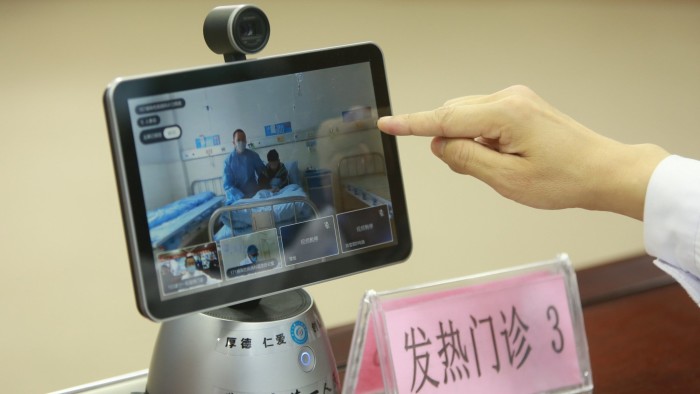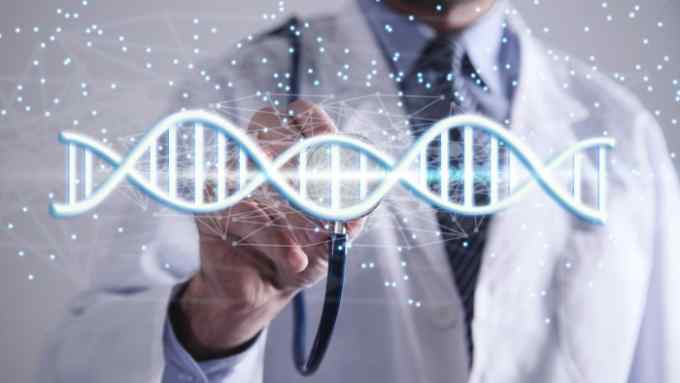Health systems worldwide receive wake-up call


Roula Khalaf, Editor of the FT, selects her favourite stories in this weekly newsletter.
The business case for using artificial intelligence in healthcare was strong even before the coronavirus outbreak stretched hospitals to their breaking point and put medical innovation atop the world’s agenda.
Investors were already funding scheduling programmes that sought to maximise the use of operating rooms, nursing staff and other resources as well as trying to embed AI-powered decision making into routine care. Data provider CB Insights reported that 367 healthcare AI start-ups received $4bn in funding last year, and the consultancy Accenture estimates that in the US, machine learning will save $150bn annually by 2026.
Some of the most successful projects have involved using computers to monitor patients, both at home and in hospital, and send alerts to medics when the data suggest that interventions may be needed. Some programmes have helped cut the death rate from sepsis, and assisted people with type-2 diabetes to reverse their symptoms.
Other companies have harnessed AI to speed up drug development. The UK’s BenevolentAI, for example, is trying to cut the time and cost of drug development by sifting through millions of scientific papers to match molecules to diseases. This work has been focused on so-called precision medicine, which allows doctors to find the drugs best suited to individual patients with particular genetic markers, boosting the chances of success.
Now much of this work is focused on managing, treating and preventing the spread of Covid-19, which will relieve pressure on health systems. AgileMD, for example, builds clinical decision-making tools to help doctors and nurses decide more quickly how to treat patients and manage resources. Those programmes are currently available for free to interested healthcare systems.
Companies including BioIntelliSense and Google’s Verily division are focusing on tiny sensors and other equipment that allow patients to be monitored at home. BioIntelliSense’s tiny sticker tracks everything from heartbeat and temperature to coughing, sneezing and vomiting frequency. The aim is to keep people away from emergency rooms where the risk of infection is high while ensuring that those who need care receive it.
Several Chinese companies have made significant progress in training AI systems to speed up diagnosis of coronavirus infections. The research arm of ecommerce group Alibaba has a system that can process chest scans in 30 seconds, compared with 10 minutes or more for a human, and claims to have used it to diagnose more than 30,000 cases. Florida hospitals are trying a visitor screening system that analyses facial attributes such as sweating and discolouration as well as data from a thermal scan. China’s SenseTime combines thermal scanners with facial recognition technology that can pick out people who fail to wear masks in public places. (The scanners are controversial because they purportedly can identify people even when they are wearing masks).
South Korean officials credit the technology with helping their world-leading efforts to test for and track the disease — molecular biotech company Seegene used AI to speed up development of its testing kit.
Other efforts will take longer to have an impact on patient care. Six big US research universities are joining with Microsoft and C3.ai, an AI software provider, to launch the C3.ai Digital Transformation Institute with $367m in industry funding. It is starting with a call for proposals on how to use the technology to curb the spread of Covid-19 as well as prepare for future pandemics. Participants include the University of Chicago, Princeton, MIT and Carnegie Mellon.
The White House’s Office of Science and Technology Policy also has asked AI researchers to analyse 29,000 scholarly articles to see if they can come up with the answers to basic questions about the disease. The data set is being made publicly available.
And both China’s Baidu and Google’s DeepMind have used their AI technology to help predict the possible chemical structure of the coronavirus’s proteins, which may make it easier to create a medicine or vaccine.
So far, companies have prioritised speed over profits, with many groups making public data that they would normally consider proprietary information. “It’s really all hands on deck for this,” says Eric Horvitz, Microsoft’s chief scientific officer.
Over the long-term, many analysts believe that the pandemic is a wake-up call that only reinforces the importance of bringing AI into healthcare — and using it to save both money and lives.
Brooke Masters is the FT’s opinion and analysis editor

Comments